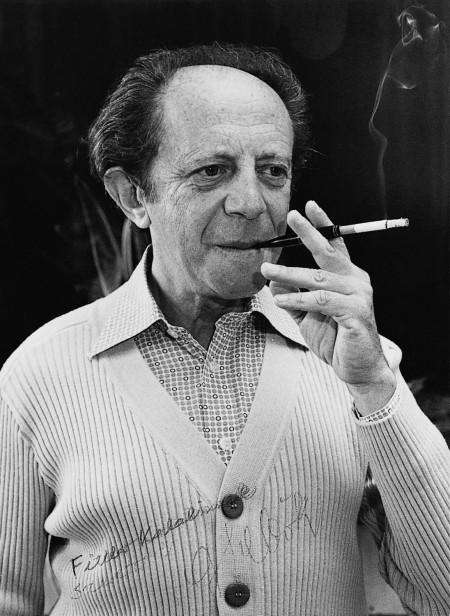
2 November 1922, Szeged – 14 November 1999, Bloomington
He reached a kind of wise worldview that was associated with the crystalline transparent, arranged though immeasurable richness of his musical word. The outward stations of his career provide little evidence of these: all the others – the Essence – are his secret, the beneficiaries of which are those with whom he selflessly shared his spiritual treasure.
During his school career beginning early successfully he was a student of Arnold Székely at the Academy of Music from 1938, following his retirement he continued his piano studies with Imre Keéri-Szántó until the death of whom, occurred on February 22 in 1940. He also studied composition with Kodály for one year. As a collaborative pianist for the students of Ede Zathureczky, Imre Molnár and Géza Kresz he could apply soon that he had learned at the chamber music lessons with Leó Weiner. He took private lessons with Paul Weingarten who moved from Vienna to Budapest, and then he was teaching at the conservatory from 1949 to 1957.
Following the war he gave frequent recitals abroad and it was that time when they became artistic friends with his later fellow professor, János Starker. He lived in Paris from 1957 to 1962, where he was awarded Grand Prix du Disque in 1958 already for his first solo recording made under the label Erato including Liszt-works in its program. He made twenty-four recordings altogether in that period.
The next and eventual scene of his life was Bloomington (USA), where he was a professor of Indiana University and Distinguished Professor from 1958. His pedagogic work was not concentrated in one place; it was extended almost world-wide: he was a regular returning guest professor of the Academy of Arts in Berlin from 1984, and gave master classes from time to time in Paris, Tokyo, Barcelona, Banff (after Keszthely and the Bartók Seminar in Szombathely several times at the Academy of Music, frequently with a joint recital there).
He dreamed of and realized the ‘Ernen Musikdorf' in a small village in Switzerland. Since his first master class in 1974 was followed by further ones of increasing interest, therefore the program soon developed to be a festival. Sebők has been the third honorary citizen of Ernen in 1988 of the past eight hundred years.
The worthiest acknowledgement from his fatherland was the Cross of Merit of the Republic of Hungary that he received in Washington. He was also awarded La Medaille de la Ville de Paris by Jacques Chirac in 1995; and next year he received a Swiss acknowledgement and the most prestigious one the Chevalier de L'Ordre des Arts et des Lettres by the French Government in 1996.
Music is inseparable from the being of Sebők. Probably it was always a vital element of his; in any case he had his students and fellow teachers felt the inexhaustible treasure of the artistic world. He took part in chamber music playing in his entire life. He made his last recording of the Concertino by Leó Weiner as a soloist of the Weiner-Szász Chamber Symphonic Orchestra under the baton of Tibor Varga. The special atmosphere of his stage performances were provided by that the audience could take for granted: it was not an achievement of an interpreter, but a re-creation that makes the message of works a sounding reality in terms of the schumannian Der Dichter spricht. At such occasions it has always been proven again: music is the art with the most immediate effect to the human soul.
He transferred from his former chamber music professor the spirit in terms of which ‘sound is existing because I can hear it, and the more I can hear it, the more it is existing.' His being as unique, unrepeatable and incomparable a pedagogue can probably be embraced in that he did not preferred the work to the performer, at the same time his work (partially skill-developing) with the student could not be done at the expense of the composition. He could find the way to the efficient solution of a problem in any specific case. His aim was not ‘correction', but to get his students used to find the good solutions. He easily had a word with musicians of any nation (any mother tongue), from any music culture: being in line with the personality, obtaining confidence their joint work for a noble purpose became successful soon.
He anticipated trust and love for those who wanted to study and got them to believe: music carries a message that can be conveyed by the performer only if he could understand that and is able to realize the intention of the composer.
F. K.


